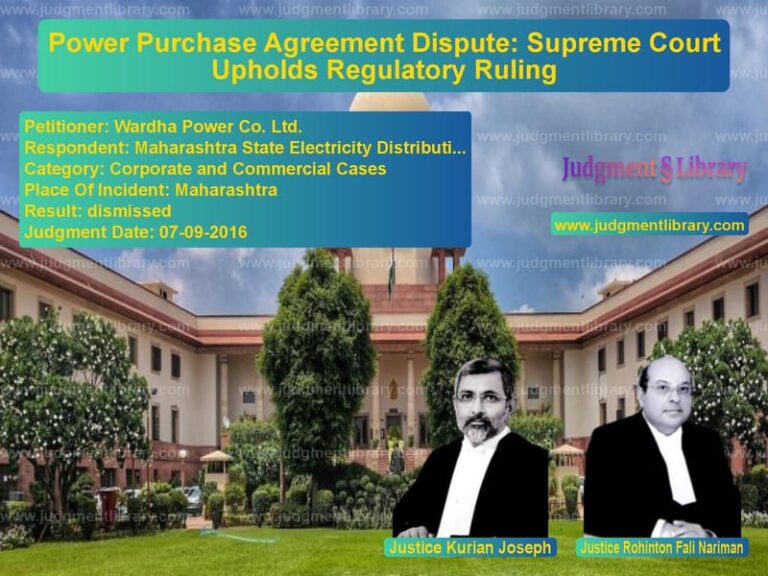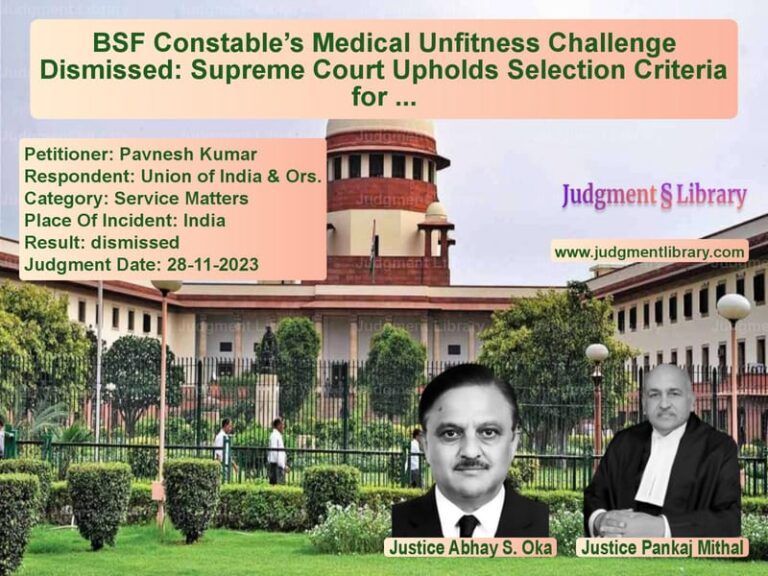Supreme Court Strikes Down High Court’s Mandamus in Bharat Forge Ltd. Case
The Supreme Court of India delivered a crucial judgment in the case of Union of India & Others vs. Bharat Forge Ltd. & Another on August 16, 2022. The matter concerned a dispute over a government procurement process where different bidders applied varying GST rates, affecting the inter-se ranking and fairness in tendering. The case was initially decided by the High Court of Allahabad, which issued a Writ of Mandamus requiring the government to specify the Harmonized System of Nomenclature (HSN) code for taxation in tender documents.
The Supreme Court, however, overturned the High Court’s decision, ruling that no such statutory duty existed. The judgment provided significant clarity on taxation in government contracts, fair competition, and the limits of judicial interference in commercial matters.
Background of the Case
The case originated from a global tender issued on April 11, 2019, by the Diesel Locomotive Works, Varanasi (DLW), a unit under the Indian Railways, for the procurement of turbo wheel impeller balance assembly. The tender attracted multiple bids, including that of Bharat Forge Ltd., the petitioner in the High Court.
The main contention in the case was that different bidders quoted different GST rates—some at 5% and others at 18%. This disparity resulted in lower total bids for those quoting the 5% rate, giving them an unfair advantage over bidders quoting 18%.
Key Issues Raised
- Whether the government (as the procuring entity) was obligated to specify the HSN code in the tender document.
- Whether the lack of a uniform GST rate in the bids distorted fair competition.
- Whether the High Court could issue a Writ of Mandamus directing the government to seek clarification from tax authorities regarding the correct HSN code.
- Whether a deviation in tax rates quoted by bidders could result in unfair competition and affect the Make in India policy.
Arguments by the Petitioner (Bharat Forge Ltd.)
The petitioner argued that:
- The failure to mention the correct HSN code in the tender document led to unfair competition.
- As per the GST framework, turbocharger components should be taxed at 18%.
- Bidders quoting a lower tax rate had an unfair advantage and could secure contracts based on artificially lower bid values.
- Providing a uniform HSN code in tender documents would create a level playing field.
- The Make in India policy was being compromised as foreign traders (importers) could undercut Indian manufacturers.
Arguments by the Respondents (Union of India & DLW)
The respondents countered:
- The responsibility to determine the correct GST rate lay with the bidder, not the procuring authority.
- The government could not dictate tax classification as it fell under the jurisdiction of the GST authorities.
- The tender conditions clearly stated that bidders were responsible for compliance with tax laws.
- If a bidder quoted a lower GST rate incorrectly, they would be liable to pay the difference and could not pass the burden onto the government.
- The High Court overstepped its jurisdiction by directing the government to clarify tax classification.
Observations by the Supreme Court
The Supreme Court bench, comprising Justice K.M. Joseph and Justice Hrishikesh Roy, provided the following key observations:
1. Writ of Mandamus Should Be Based on Statutory Duty
The Court ruled:
“A Writ of Mandamus can only be issued where a statutory duty exists. There is no statutory requirement for the procuring entity to specify the HSN code in the tender document.”
2. Government Cannot Determine GST Classification
The judgment emphasized that tax classification falls under the jurisdiction of GST authorities:
“The determination of HSN code and applicable GST rates is the sole prerogative of GST authorities. The government as a buyer cannot be burdened with this responsibility.”
3. Fair Competition and Bid Evaluation
Addressing the petitioner’s claim of unfair competition, the Court noted:
“Bidders must be responsible for their own tax compliance. The tender conditions clearly outline that bidders should quote their tax liabilities correctly, failing which they will bear the consequences.”
4. Clarification with GST Authorities Not Practical
The Supreme Court rejected the High Court’s direction that the government should clarify tax rates with GST authorities:
“The process of seeking clarification with GST authorities is cumbersome and impractical, given the complexities of tax rulings, appellate mechanisms, and jurisdictional variations.”
5. Level Playing Field in Tenders
Regarding concerns over a level playing field, the Court ruled:
“The tender document allows bidders to quote the applicable tax rate. Any misclassification or underreporting is a bidder’s liability and does not impact the fairness of the process.”
Final Judgment
The Supreme Court allowed the appeal and set aside the High Court’s order, stating:
“The High Court erred in issuing directions that were beyond its jurisdiction. The appeal is allowed, and the impugned judgment is set aside.”
However, in order to ensure compliance with tax regulations, the Court directed:
- The procuring authority must forward a copy of the awarded contract to the jurisdictional tax officer of the successful bidder.
- Bidders must provide details of their GST registration and tax jurisdiction in their bid submissions.
Impact of the Judgment
The ruling has significant implications:
- Clarifies the Role of Procuring Authorities: The government is not responsible for tax classification but must ensure compliance through post-award reporting.
- Limits Judicial Overreach: The judgment sets a precedent that courts should not interfere in contractual matters unless there is a clear statutory violation.
- Fair Competition Reinforced: Bidders are responsible for their tax compliance, preventing manipulation of bid values through misquoted GST rates.
- Administrative Efficiency: Government departments are relieved from the burden of determining tax rates, allowing them to focus on procurement efficiency.
Conclusion
The Supreme Court’s decision in Union of India vs. Bharat Forge Ltd. upholds fundamental principles of taxation and contract law. By rejecting the High Court’s Mandamus, the ruling reinforces the division of responsibilities between tax authorities and procurement agencies. The Court’s direction to forward awarded contracts to tax authorities ensures compliance without burdening procurement processes.
Moving forward, bidders must exercise due diligence in tax matters, while the government must ensure transparency in bid evaluation without assuming responsibilities beyond its legal mandate.
Petitioner Name: Union of India & Others.Respondent Name: Bharat Forge Ltd. & Another.Judgment By: Justice K.M. Joseph, Justice Hrishikesh Roy.Place Of Incident: Varanasi, Uttar Pradesh.Judgment Date: 15-08-2022.
Don’t miss out on the full details! Download the complete judgment in PDF format below and gain valuable insights instantly!
Download Judgment: union-of-india-&-oth-vs-bharat-forge-ltd.-&-supreme-court-of-india-judgment-dated-15-08-2022.pdf
Directly Download Judgment: Directly download this Judgment
See all petitions in GST Law
See all petitions in Tax Evasion Cases
See all petitions in Banking Regulations
See all petitions in Judgment by K.M. Joseph
See all petitions in Judgment by Hrishikesh Roy
See all petitions in allowed
See all petitions in Quashed
See all petitions in supreme court of India judgments August 2022
See all petitions in 2022 judgments
See all posts in Taxation and Financial Cases Category
See all allowed petitions in Taxation and Financial Cases Category
See all Dismissed petitions in Taxation and Financial Cases Category
See all partially allowed petitions in Taxation and Financial Cases Category







